Grilling season is here, and with it comes the potential for grease fires. A grease fire on your grill can be a dangerous and messy situation, but don’t worry – we’ve got you covered on how to clean up afterward.
In this blog post, we’ll walk you through the necessary steps to get your grill back in tip-top shape after a grease fire so that you can continue cooking up those delicious meals without fear of another flare-up.
Read on to learn about what causes these fires, how to safely clean your grill after one occurs, and tips for prevention in the future.
Key Takeaways
- Grease fires can be dangerous and cause extensive property damage, so it’s important to prioritize safety. Allow your grill to cool down after a fire before attempting any cleaning procedures.
- Thoroughly clean the grates, the interior of the grill, and burner tubes using hot soapy water or food-safe degreasers like Simple Green. Wear appropriate protective gear and always dispose of greasy materials safely.
- Regular maintenance and cleaning of your grill can help prevent future grease fires from occurring. Take necessary precautions when using a grill, such as keeping an eye on flare-ups during cooking and having a fire extinguisher nearby in case of emergencies.
What Is A Grease Fire And Why Is It Dangerous?
Grease fires occur when excess oil or grease on a grill catches fire, creating flames that can quickly spread and become out of control.
How Grease Fires Occur
Grease fires occur when the excess fats and oils on a grill become hot enough to ignite, transforming into a dangerous situation that can quickly escalate.
The process typically begins as heat builds up within the grill, causing accumulated grease residues to vaporize and create volatile gases.
One common example of how grease fires can start is through flare-ups during grilling. As food cooks on the grill, fats may drip down onto hot surfaces or open flames, igniting small bursts of fire due to intense heat exposure.
The Dangers Of Grease Fires
Grease fires pose a significant threat to both personal safety and property. These fires occur when cooking oils, fats, or greases reach their ignition point and can quickly become uncontrollable due to the highly flammable nature of these substances.
In addition to the physical perils associated with grease fires, they also have the potential for causing extensive damage to homes and properties. A seemingly small grease fire on your grill can easily spread if not properly extinguished using appropriate methods – remember never use water on a grease fire! Moreover, heated grease that isn’t adequately cleaned from your grill may obstruct gas flow and cause flashback fires, which pose another set of hazards altogether.
Steps To Clean A Grill After A Grease Fire
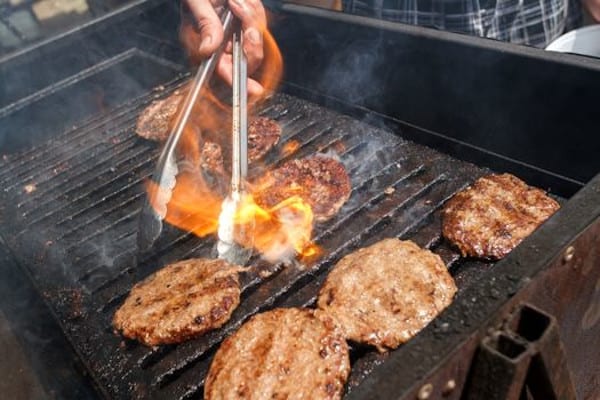
The first step to cleaning a grill after a grease fire is making sure it has cooled down, followed by removing and cleaning the grates, scrubbing the interior of the grill with soapy water or a degreaser, and checking burners and control knobs.
Safety First: Allow The Grill To Cool Down
Prioritizing safety is a crucial aspect of cleaning your grill after a grease fire. One important step to ensure safety is allowing the grill to cool down before attempting any cleanup procedures.
Typically, it’s best to wait at least an hour after extinguishing a grease fire before beginning the cleaning process. This gives enough time for even the most hidden areas inside your grill—such as burners and control knobs—to reach a safe temperature.
Additionally, while waiting for your grill to cool down, it’s essential not only to turn off the gas supply or remove charcoal but also to keep children and pets away from the area, ensuring everyone’s safety during this crucial period.
Removing And Cleaning The Grates
Once the grill has cooled down, it’s time to tackle the grates. Start by removing them from the grill and inspecting them for any damage or corrosion.
Using a sponge or a grill brush, scrape off any debris or grease on the grates. For stubborn grease that won’t come off with just a simple scrubbing, use a scraper to remove it gently.
Soaking them in hot soapy water or using a food-safe degreaser like Simple Green will help break down any remaining residue and make cleaning easier.
Cleaning The Interior Of The Grill
Once you have removed the grates and burner hoods, it’s time to tackle the interior of the grill. Scrubbing down this area is crucial to prevent any leftover grease or residue from starting another fire.
Start by wiping down the inside of the lid with a damp cloth or sponge, being careful not to scratch any surfaces. Then, move on to cleaning the walls and bottom of the grill using hot soapy water or a food-safe degreaser.
If there are still stubborn bits of grease that won’t come off, try using a scraper or wire brush but avoid using harsh chemicals. Once everything has been thoroughly cleaned, rinse it down with clean water and dry off any excess moisture before reassembling your grill.
Checking Burners And Control Knobs
It’s essential to check the burners and control knobs of your grill after a grease fire. The intense heat from a blaze can damage these components, causing them to malfunction or break down entirely.
Take the time to inspect each knob thoroughly and ensure that it turns freely without resistance.
Similarly, examine each burner tube in detail and utilize an appropriate bottle brush to clean out any residual grease or debris that may have accumulated inside it. This step can help prevent future flare-ups by reducing the risk of grease accumulating in the tubes over time.
Reassembling And Testing The Grill
Once all the parts of your grill have been cleaned and properly dried, it’s time to reassemble everything. Start by putting the grates back in place, followed by any other removable components you may have taken off during the cleaning process.
Once everything is back together, it’s important to test your grill before cooking on it again. Open up your propane tank or turn on the gas line and light each burner individually to make sure they are working correctly.
Following these steps will help ensure that your grill is in safe and optimal working condition after a grease fire incident. Remember to always take necessary safety precautions when cleaning or using a grill, as grease fires can happen unexpectedly if proper care isn’t taken.
Safety Tips For Cleaning A Grill After A Grease Fire
Wear protective gear and use appropriate cleaning solutions when cleaning a grill after a grease fire to ensure your safety; read on for more tips on safely and effectively removing any residual grease.
Wear Protective Gear
It is crucial to wear protective gear when cleaning a grill after a grease fire. Grease fires can be dangerous, and residual grease can still be hot and potentially hazardous even after the flame has been put out.
Protective gear such as gloves, eye protection, long sleeves, and pants should be worn to prevent burns or injuring oneself while handling the grill grates or cleaning the interior of the grill.
It is also important to dispose of greasy materials safely to avoid any potential fires or accidents.
Use Appropriate Cleaning Solutions
When it comes to cleaning a grill after a grease fire, using the right cleaning solution is crucial. It’s important to avoid harsh chemicals as they can damage the grill and even contaminate your food.
For tougher stains and residues, you can use a degreaser specifically designed for grills or baking soda mixed with water to create a paste. However, make sure to read the manufacturer’s instructions before using any product on your grill as some may not be suitable for certain types of grills.
Dispose Of Greasy Materials Safely
When it comes to cleaning a grill after a grease fire, properly disposing of the greasy materials is crucial. Improper disposal can lead to another fire or damage to your trash can.
It’s recommended that you let any greasy rags or paper towels soak in water before throwing them away. This will help prevent combustion due to residual grease.
Another way to dispose of greasy materials safely is by recycling them. Some hardware stores and recycling centers may accept used cooking oil, which you can bring in sealed containers for proper disposal.
Remembering these safety tips when disposing of greasy materials after cleaning your grill post-grease fire will not only help keep your home safe but also reduce waste and promote sustainability!
Take Caution With Electrical Parts
It is essential to take caution when dealing with electrical parts while cleaning a grill after a grease fire. Before starting the cleaning process, make sure that the grill is turned off and unplugged to avoid any accidents.
The use of water or other liquids can be hazardous when cleaning electrical parts, and it’s best to use a dry cloth or brush instead. Remember that incorrect handling of these parts can lead to damage or harm, so if you’re unsure about how to proceed, it’s always best to seek professional assistance.
When To Seek Professional Help And Common Mistakes To Avoid
It is essential to seek professional help if a grease fire on your grill gets out of control or causes damage beyond repair.
– Neglecting to clean the drip pan: The accumulation of grease in the drip pan can lead to flare-ups and fires.
– Using harsh chemicals: Avoid using strong chemicals that can harm the environment or damage the surfaces of your grill.
– Leaving residual grease on the grates: Always make sure to remove any remaining residue from previous cooking sessions before grilling again.
– Ignoring warning signs: If you notice unusual smells, smoke, or flames while using your grill, turn off the gas immediately and seek professional help.
– Not replacing damaged parts: Damaged burners, control knobs, or other parts can cause safety hazards.
Remember that by taking proper care of your grill and following safety protocols, you can prevent grease fires and ensure its longevity.
Conclusion
Cleaning a grill after a grease fire is essential for not just the longevity of your grill, but also for safety reasons. Never leave your grill unattended and always have a fire extinguisher nearby.
Use soapy water or a degreaser to clean the grates, interior, and drip pan thoroughly before using it again. Take necessary precautions and maintain your grill regularly to prevent future grease fires from occurring.
Frequently Asked Questions:
1. What causes grease fires on a grill?
Grease fires can be caused by an accumulation of oil and grease on the grill grates, drip pans, and inside of the grill. When the grill is turned on, the grease can catch on fire and spread quickly.
2. How can I prevent a grease fire on my grill?
To prevent a grease fire on your grill, it’s important to clean your grill regularly and remove any excess oil or grease. You can also prevent grease fires by using a grill brush to scrape the grates and make sure they are clean before cooking.
3. What do I do if there is a grease fire on my grill?
If there is a grease fire on your grill, turn off the grill and remove any food from the grill. Do not try to move the grill or put out the fire with water. Instead, use a fire extinguisher to put out the fire or let it burn off on its own if it’s safe to do so.
4. How often should I clean my grill?
It’s important to clean your grill regularly to prevent grease fires and ensure it’s safe to use. How often you clean it will depend on how frequently you use the grill, but it’s recommended to clean it thoroughly before and after each use.
5. How can I make sure my grill is safe to use after a grease fire?
After a grease fire, it’s important to inspect your grill thoroughly and make sure it’s safe to use. Check for any damage to the grates, catch pan, propane tank, or any other parts of the grill. If you’re not sure, contact a professional or your local fire department for assistance.
6. Can I use baking soda to put out a grease fire on my grill?
Yes, baking soda can be used to put out a grease fire on your grill. However, it’s important to use the correct amount and apply it carefully. Be sure to read the instructions on the packaging first.
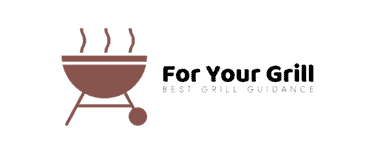
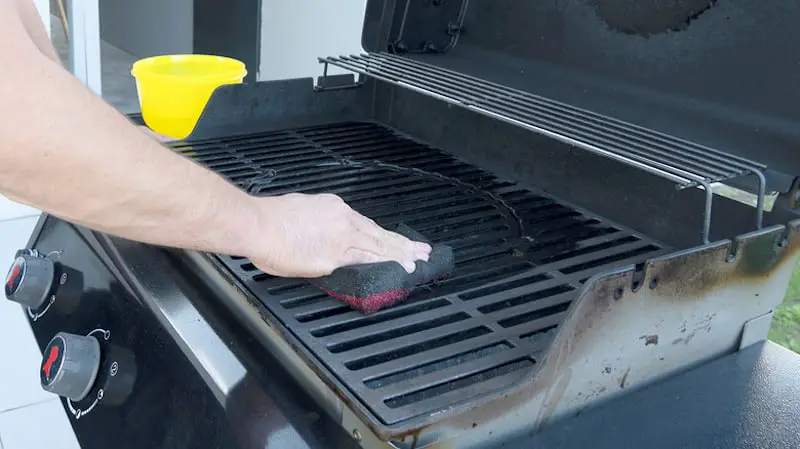
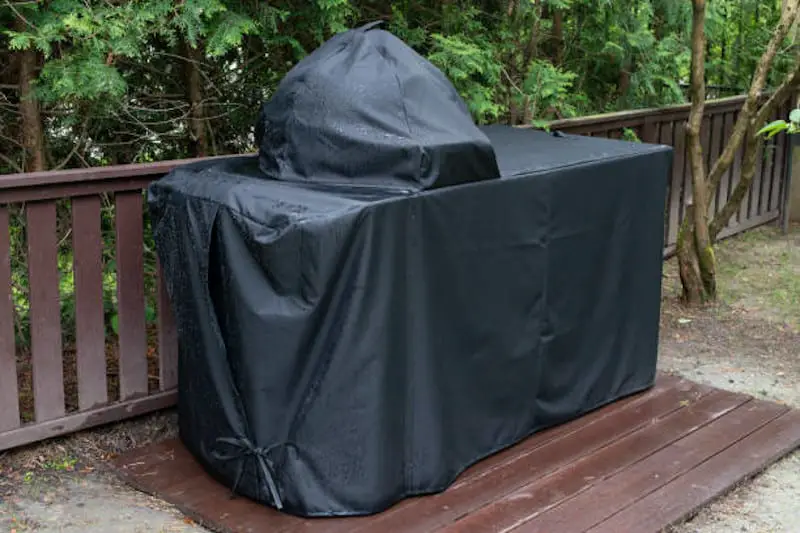
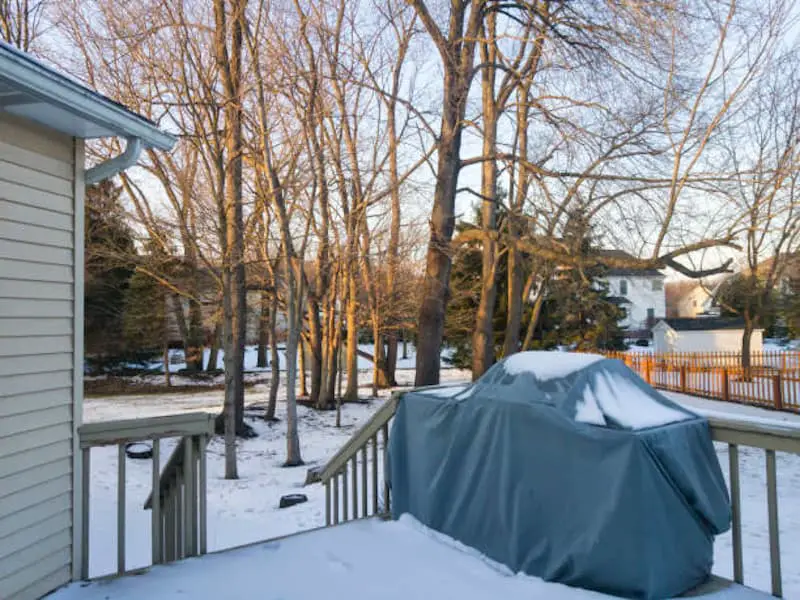
Leave a Reply